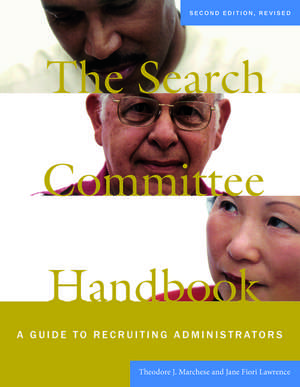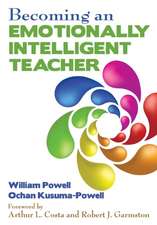The Search Committee Handbook: A Guide to Recruiting Administrators
Autor Theodore J. Marchese, Jane Fiori Lawrenceen Limba Engleză Paperback – 11 oct 2005
Preț: 216.29 lei
Nou
Puncte Express: 324
Preț estimativ în valută:
41.40€ • 44.98$ • 34.80£
41.40€ • 44.98$ • 34.80£
Carte disponibilă
Livrare economică 31 martie-14 aprilie
Preluare comenzi: 021 569.72.76
Specificații
ISBN-13: 9781579221775
ISBN-10: 1579221777
Pagini: 96
Dimensiuni: 212 x 273 x 7 mm
Greutate: 0.32 kg
Ediția:Revised
Editura: Taylor & Francis
Colecția Routledge
Locul publicării:Oxford, United Kingdom
ISBN-10: 1579221777
Pagini: 96
Dimensiuni: 212 x 273 x 7 mm
Greutate: 0.32 kg
Ediția:Revised
Editura: Taylor & Francis
Colecția Routledge
Locul publicării:Oxford, United Kingdom
Public țintă
Professional Practice & DevelopmentCuprins
Introduction; 1 The Vacancy. An Organizational Opportunity. Campus leaders know that nothing they do is more important than to recruit, nurture, and; advance the talents of line managers and administrative staff, who make their college or university work. When an administrative vacancy occurs, they see it as a dual opportunity for their institution. first to rethink a function—the role and goals of a position, and the character of; person needed to make it work—then to make an appointment that helps to achieve them; 2 The Committee. Composition, Charge, and Ground Rules. In this we assume that the institution has completed the work outlined in 1, has a good sense of what it wants from a search, and will appoint a committee to conduct it. We now address issues that confront the appointing officer as he or she gathers and charges a committee, then raise matters the officer and committee will weigh together to get the search off to a good start.; 3 The Job. Identifying Preferred Qualifications. The search committee now has its charge plus a good sense of itself, its calendar, and its terms; of work. It is ready for its initial substantive task of search. to determine as precisely as possible; what it will search for.; 4 The Search. Recruiting a Candidate Pool. An injunction heard from every search veteran we spoke with was that “committees have to; undertake active search,” meaning vigorous recruitment. We’re not sure who exactly advocates; “passive search” (an oxymoron), but the behavior proscribed is clear enough. the hapless search; committee that says at the start, “Let’s place an ad and see what comes in.”; 5 The Screening. Identifying Talent among Applicants. As the date for application review arrives, a week of intensive reading lies ahead for the committee. Members will now cull through what seem daunting piles of application materials to locate candidates of highest promise. In this , we show how the committee can screen; a hypothetical set of 60 applications down to 6 or 8. It’s a task that demands care. These are choices about real people, with candidates and your campus alike trusting your judgment.; 6 The Interviews. Knowing and Courting Candidates. This longest of the Handbook’s s will help your search committee work through an; important set of next questions. how to interview your remaining candidates, how many to; bring to campus, how to structure those visits for mutual learning, and how to complete your evaluation of the finalists. By ’s end, the committee should have gathered all the information it needs to proceed with recommendations to the appointing officer.; 7 Making the Appointment. At long last the committee is ready to realize the main point of its work. the recommendation of; candidates to the appointing officer. That officer in turn will need to weigh, offer, negotiate, and; conclude an appointment. All parties then need to bring that appointee into the institution and; position in ways that set him or her up for success; Web Sites, Resources, and Associations; Annotated Bibliography; Acknowledgments; Advisory Board; About the Authors; Index.
Notă biografică
Theodore J. Marchese is Senior Consultant at the Academic Search Consultation Service. He served as Vice President of the American Association for Higher Education and as Executive Editor of Change magazine. Jane Fiori Lawrence is Vice Chancellor for Student Affairs at the University of California, Merced.
Descriere
* Reviews of the first edition:"Finally, higher education has an intelligent guide for recruiting administrators--an activity often taken for granted and not always thoughtfully carried out.






